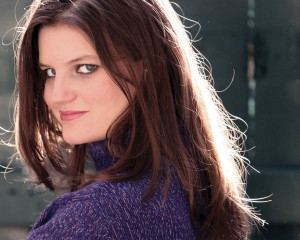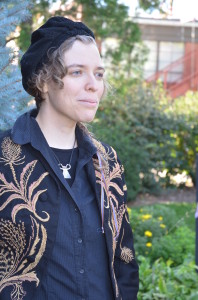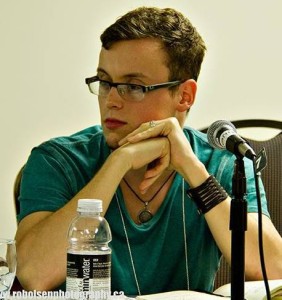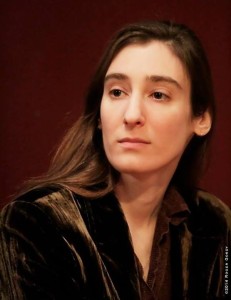Today’s interview features Brittany Warman, who contributed to the Body issue with her poem “Rep/ercussions (Carmina): Reflections on Obsession and Compulsion“. This is her first poem in Stone Telling, but she has had two nonfiction pieces in the magazine previously, “Journal of Mythic Arts Retrospective I: Personal Reflections” (co-authored with Amal El-Mohtar and Alan Yee), and a review of “Unruly Islands, poetry by Liz Henry“.
Brittany Warman is a PhD student in English and Folklore at The Ohio State University, where she concentrates on the intersection between literature and folklore, particularly fairy tale retellings. Her creative work has been published by or is forthcoming from Mythic Delirium, Jabberwocky Magazine, Ideomancer, inkscrawl, Cabinet des Fées: Scheherezade’s Bequest, and others. She can be found online at BrittanyWarman.com
Spelling a word correctly is a casting (and you try)
But the best words are silent (the way words can be)
Like/not-like longing (how?)
(A) creation, (a) fear.
– from “Rep/ercussions (Carmina): Reflections on Obsession and Compulsion“
ST: What inspired this particular poem? What would you like readers to know about your context, and how it relates to your poem?
“Rep/ercussions (Carmina)” is one of the most personal, difficult poems I’ve ever written, in both form and topic. It deals with an aspect of my life that I don’t often talk about – my experiences with obsessive compulsive disorder – and, as I wrote on my own blog, I suppose in some ways this poem marks a sort of ‘coming out’ for me as a person with a serious mental illness that I struggle with every day. I wasn’t initially sure that I wanted to put that fact out in the world in such a public way, but the call for this issue really brought home the idea that it could be important for me to try to illustrate obsessive compulsive disorder in a way that speaks to my own experience of it. The term “obsessive compulsive” is used very casually far too often – you hear people jokingly saying things like “oh, I’m so OCD” all the time – and I hope this poem shows a different, more complex side of it than what is normally considered.
ST: Is the Body a central theme in your work? If so, what other works of yours deal with it? If not, what called you to it this time?
I do feel that the workings of the brain, the mental aspect of the body, comes up often in my work. I think in particular of the poem “Alice Underground” from Issue #25 of Niteblade and “Skin,” a longer piece I co-wrote with Sara Cleto, from the December 2013 issue of Ideomancer.
ST: What else would you like to tell our readers about your poem?
OCD is, in many ways, an extreme form of magical thinking and I wanted to show that side of the disorder as well. Despite the frustration, the fear, the anger, and the depression it has caused in my life, I recognize that there is also something strangely beautiful in seeing the world in this way, a both ordered and chaotic experience of the universe. I hope I was able to convey at least a small part of that in this poem as well.
ST: Do you have any upcoming projects you might like to talk about?
I am necessarily focused mainly on my candidacy exam reading for my PhD in English and Folklore right now, but I am trying to find the time to work on several new projects, including two that I hope will be able to use the medium of the Internet in interesting ways! I will also have a flash fiction piece in the new “sea” themed issue of Cabinet des Fées’ Scheherezade’s Bequest.
ST: Thank you very much, Brittany!
_____
If you enjoyed this poem and the interview, please consider letting the poet know! Also, we now have a Patreon page, and would appreciate your support.





